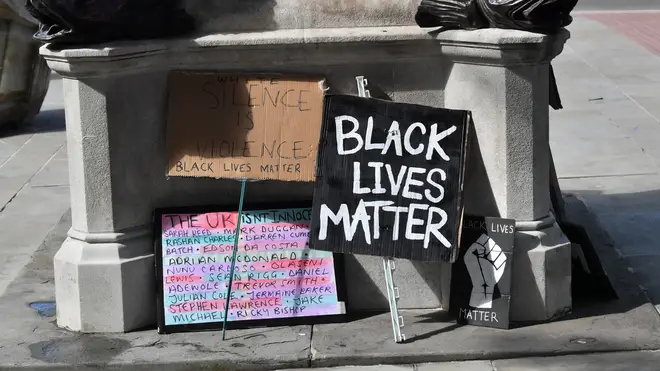
Iain Dale 7pm - 10pm
9 June 2020, 18:30

Monuments from Edinburgh to Bristol have been spotlighted for the controversial characters they depict amid revived debate about racism in Britain.
Edward Colston, the 17th century slave trader, was the first to be demoted when his statue in Bristol was torn down by protesters at the weekend, and dunked in the nearby harbour.
Inspired by the move, thousands of people then signed a petition to remove a long-contested statue of imperialist Cecil Rhodes at Oxford University's Oriel college.
A statue of Sir Thomas Picton is also under fire in Cardiff - a man celebrated for being the highest-ranking officer killed at Waterloo, but also condemned for earning much of his fortune through the slave trade, killing dozens of slaves, and standing trial for ordering the torture of a 14-year-old mixed-race child.
READ MORE: Banksy suggests what to do with the toppled Edward Colston statue
READ MORE: 'Obvious racist' sign removed from Derbyshire pub - but locals say this is to protect it
In a letter to Cardiff City Council asking for the memorialisation to be removed, city mayor Dan De'Ath also pointed toward the "highly brutal regime" led by Picton during his governorship of Trinidad.
He then drew upon a quote from WalesOnline, which had called Picton "a monster".
Petitions have also been launched in Edinburgh and Shropshire - the former to bring down a statue of slave owner Henry Dundas, and the latter for 'Clive of India' Robert Clive.

Anti-racism protesters tear down controversial statue of slave trader in Bristol
The focus on taking down the monuments has come as a development from demonstrations starting in the US, later spreading across the world, in calling for deeply-embedded racist ideals to be addressed.
It follows the death of black man George Floyd two weeks ago in Minneapolis, whose final moments were caught on camera as he lay face down - unarmed and handcuffed - in the street, with a white police officer, Derek Chauvin, kneeling on his neck.
READ MORE: Sadiq Khan forms diversity commission to review London landmarks
READ MORE: Calls revived to dump Oxford University statue of Cecil Rhodes
Mr Floyd never regained consciousness from the incident - and Chauvin has since been charged with second-degree murder.
Three other police officers have also been charged with aiding and abetting second-degree murder and manslaughter.

'Racist' pub sign taken down in Ashbourne
Back in the UK, Labour leader Keir Starmer told LBC's Nick Ferrari that he believed Colston's statue should have been "taken down a long, long time ago," although he did not agree in the way in which it was carried out.
Speaking to the wider issue, he added: "You can't, in 21st century Britain, have a slaver on a statue [...]
"This was a man who was responsible for 100,000 people being moved from Africa to the Caribbean as slaves, including women and children, who were branded on their chests with the name of the company that he ran.
"Of the 100,000 people, 20,000 died en route and they were chucked in the sea."
READ MORE: Key moments from a weekend of Black Lives Matter protests
READ MORE: 'History has been made' - Bristolians react to toppling of Edward Colston statue
Meanwhile, Boris Johnson's spokesman said the act of pulling it down was an "unacceptable" act, warning that the police "will want to hold to account those responsible".
He added: "The PM absolutely understands the strength of feeling, but in this country we settle our differences democratically and if people wanted the removal of the statue there are democratic routes which can be followed."